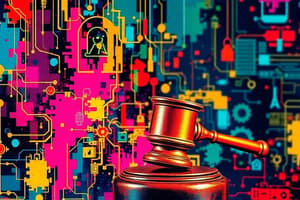Podcast
Questions and Answers
Which action constitutes computer criminal activity under section 2C:20-25a?
Which action constitutes computer criminal activity under section 2C:20-25a?
- Accessing a computer network without authorization. (correct)
- Recklessly altering data within a computer system.
- Using a computer program for its intended purpose.
- Obtaining freely available software from an online repository.
According to section 2C:20-25b, what is an example of prohibited computer criminal activity?
According to section 2C:20-25b, what is an example of prohibited computer criminal activity?
- Correcting a typo in a document on a personal computer.
- Running a regularly scheduled maintenance script.
- Accessing a website with a strong password
- Impairing computer services available to other users. (correct)
What is the severity of a crime under 2C:20-25 if unauthorized access to a computer is made with the intent to commit fraud, where the value of property obtained is less than $5,000?
What is the severity of a crime under 2C:20-25 if unauthorized access to a computer is made with the intent to commit fraud, where the value of property obtained is less than $5,000?
- Not a crime.
- Second degree crime.
- Third degree crime. (correct)
- First degree crime.
Under which circumstance does obtaining data or personal information become a second-degree crime according to section 2C:20-25e?
Under which circumstance does obtaining data or personal information become a second-degree crime according to section 2C:20-25e?
What is the degree of crime for recklessly altering data within a computer system, according to section 2C:20-25f?
What is the degree of crime for recklessly altering data within a computer system, according to section 2C:20-25f?
Which action, when done purposely and without authorization, is categorized as a third-degree crime?
Which action, when done purposely and without authorization, is categorized as a third-degree crime?
If an individual accesses a computer system for the purpose of obtaining personal information worth $7,000, what is the decree of the crime?
If an individual accesses a computer system for the purpose of obtaining personal information worth $7,000, what is the decree of the crime?
According to 2C:20-25, which of these activities can result in a second degree crime?
According to 2C:20-25, which of these activities can result in a second degree crime?
What is the degree of crime for computer-related damage if the value of the damage exceeds $5,000?
What is the degree of crime for computer-related damage if the value of the damage exceeds $5,000?
A computer crime resulting in a substantial interruption of a public service becomes a crime of the first degree if the interruption lasts for which duration?
A computer crime resulting in a substantial interruption of a public service becomes a crime of the first degree if the interruption lasts for which duration?
What is the minimum period of imprisonment required for a first-degree computer crime conviction when the victim is a government agency?
What is the minimum period of imprisonment required for a first-degree computer crime conviction when the victim is a government agency?
A computer crime that causes substantial interruption to a public service is a first degree crime if it affects how many structures or habitations?
A computer crime that causes substantial interruption to a public service is a first degree crime if it affects how many structures or habitations?
For a computer crime, when is the defendant strictly liable under the law for victim being a government agency?
For a computer crime, when is the defendant strictly liable under the law for victim being a government agency?
A computer crime resulting in damages exceeding what amount is classified as a first-degree crime?
A computer crime resulting in damages exceeding what amount is classified as a first-degree crime?
Following a conviction, if a crime is committed against a government agency and a period of imprisonment is imposed what term must be included?
Following a conviction, if a crime is committed against a government agency and a period of imprisonment is imposed what term must be included?
Can a conviction for a computer crime merge with a conviction for attempting to violate another subsection of the statute, according to the text?
Can a conviction for a computer crime merge with a conviction for attempting to violate another subsection of the statute, according to the text?
Flashcards
Unauthorized Access
Unauthorized Access
Knowingly accessing a computer system without authorization.
Computer Sabotage
Computer Sabotage
Intentionally altering, damaging, or destroying data or computer systems without permission.
Computer Fraud
Computer Fraud
Accessing a computer system to defraud or steal money, property, or personal information.
Data Theft
Data Theft
Signup and view all the flashcards
Reckless Computer Damage
Reckless Computer Damage
Signup and view all the flashcards
Computer Sabotage Penalty
Computer Sabotage Penalty
Signup and view all the flashcards
Data Theft of Sensitive Information
Data Theft of Sensitive Information
Signup and view all the flashcards
Computer Fraud Penalty
Computer Fraud Penalty
Signup and view all the flashcards
Computer Crime Degree of Offense
Computer Crime Degree of Offense
Signup and view all the flashcards
Substantial Interruption or Impairment
Substantial Interruption or Impairment
Signup and view all the flashcards
Substantial Interruption Criterion 1 (Structures)
Substantial Interruption Criterion 1 (Structures)
Signup and view all the flashcards
Substantial Interruption Criterion 2 (Duration)
Substantial Interruption Criterion 2 (Duration)
Signup and view all the flashcards
Substantial Interruption Criterion 3 (Risk)
Substantial Interruption Criterion 3 (Risk)
Signup and view all the flashcards
First Degree Computer Crime (Damage)
First Degree Computer Crime (Damage)
Signup and view all the flashcards
First Degree Computer Crime (Bodily Injury)
First Degree Computer Crime (Bodily Injury)
Signup and view all the flashcards
Computer Crime Sentence for Government Victims
Computer Crime Sentence for Government Victims
Signup and view all the flashcards
Study Notes
Computer Criminal Activity
-
Guilt: A person is guilty of computer criminal activity if they purposely or knowingly access data, computer systems, or networks without authorization or exceeding authorization.
-
Accessing Data: This includes accessing any data, databases, computer storage media, computer programs, software, equipment, or networks.
-
Altering/Damaging Data: A crime involves altering, damaging, or destroying data, databases, computers, storage media, programs, software, systems, or networks. It also includes denying, disrupting, or impairing computer services.
-
Accessing for Fraudulent Purposes: Accessing computer systems, or any data within them, to execute a fraudulent scheme. This also includes obtaining services, property, personal information, or money from the computer owner.
-
Obtaining Data: Illegally obtaining data or information stored in computers or computer networks is also criminal. This includes personal identifying information.
-
Accessing and Damaging Equipment: A crime includes accessing and recklessly altering, damaging, or destroying data, databases, computers, programs, software, computer equipment, or networks.
Degrees of Crime
-
Third-Degree Crime: A violation of subsection a. of the section is a third-degree crime, as is a violation of subsection e. with certain exceptions.
-
Second-Degree Crime: A violation of subsection b. in the section is a second-degree crime, as is a violation of subsection c. if the value of services, property, etc. exceeds $5,000.
-
First-degree Crime: Violation of any subsection in the section is also a first-degree crime when specific conditions arise, such as a significant interruption to public services or medical information.
-
Fourth-Degree Crime: A violation of subsection f. is typically a fourth-degree crime, but becomes a third-degree crime if the damage value exceeds $5,000.
Sentencing Considerations
-
Minimum Imprisonment: Sentences for first-degree crimes include a minimum term of one-third to one-half of the imposed sentence, making offenders ineligible for parole during the term. This also applies to cases where the victim is a government entity.
-
Separate Sentences: Violations under different subsections of the computer crime act, regardless if they are similar, will receive separate sentencing.
-
Aggravating Circumstances: If the victim is under 18 years old, the violation is an aggravating circumstance affecting sentencing procedures.
Studying That Suits You
Use AI to generate personalized quizzes and flashcards to suit your learning preferences.




